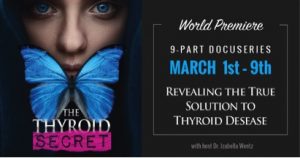 The Thyroid Secret documentary is just around the corner! My colleague Dr. Izabella Wentz and her amazing team have produced this powerful 9-part documentary and it truly is groundbreaking! (It starts on March 1.)
The Thyroid Secret documentary is just around the corner! My colleague Dr. Izabella Wentz and her amazing team have produced this powerful 9-part documentary and it truly is groundbreaking! (It starts on March 1.)
Thyroid disease is one of the most overlooked diseases and is so often misdiagnosed. I see this all this time with my anxious clients (and I share more about this in the documentary!)
In case you’re not already signed up here is the link to sign up. And some wise words of wisdom from some of the experts that are part of the documentary
If you are already signed up enjoy these wise words too!
Dr. Izabella Wentz, host and producer of the documentary, and author of the forthcoming book, Hashimoto’s Protocol, sets the tone and I love it!
A person who has their health has 1,000 dreams. A person who does not has just one.
Allowing yourself to heal will allow you to do all these different things in your life that you maybe dreamed about but you never thought were possible. I have people within my community who’ve become like romance novelists or … they’ve gone back to horseback riding. They’ve done all of these things that they never thought will be possible and sometimes in their 40s, 50s, 60s, lucky ones in their 20s.
Dr. Mark Hyman, author of The Blood Sugar Solution, discusses the prevalence of thyroid disease in this part of his interview:
Thyroid disease is extremely prevalent, one in five women and one in ten men have low thyroid function. That’s an enormous number of people and half of them they don’t know it. They’re not even diagnosed and the ones that are diagnosed and treated most of those are inadequately treated.
You’ve got an epidemic or thyroid dysfunction that is really driving a lot of suffering and it’s subtle. People don’t know, they think it’s something else. Oh I’m a little tired, oh I have trouble getting up in the morning, my skin’s a little dry, my nails are cracking, I’m a little constipated, I have a little fluid retention. Can’t remember things as well, I feel little depressed, I might not be sleeping as well, I might get muscle cramps, my sex drive’s a little low… You add all these things up, oh my hair’s falling out a little bit.
Dr. Hyla Cass, integrative psychiatrist, talks about antidepressant side-effects in this part of her interview:
I think people have to be their own medical detectives in partnership with Functional Medicine docs like me because they know themselves better than I do.
I think the way conventional medicine is treating depression is really a disaster and that’s simply writing prescriptions for antidepressants. I get a lot of these women and women outnumbering men with thyroid issues coming to me, that have been failures. ‘Failures’ at antidepressant therapy, they’re still depressed and they’re not only still depressed but they now have side effects from being on antidepressants. They can’t sleep or they’re sleeping too much, weight gain, huge weight gain (with thyroid issues you’re already gaining weight). Then there is dizziness, nausea, lack of libido… I mean really? So many problems with the antidepressants and it’s not directed to the cause.
Dr. Alan Christianson, author of The Adrenal Reset Diet, covers our genes and environmental toxins in this part of his interview:
Thyroid cancer, thyroid autoimmunity are much more common among women. We’re seeing about a eight to one female to male risk difference.
So, we think that it’s really a perfect storm of three, three large factors; we’ve got the, the genes, you know. So, the first step is you got to be cautious about choosing your parents (laughter), however that works out, I don’t know. So, there’s some genetic susceptibility and then, and there’s some foreign substances. So, your thyroid like, there’s the shows about the hoarders you know, like those that like never let go of things. So, your thyroid is kind of a hoarder (laughter). It needs iodine, but the amount that it needs is way above what your blood carries, so it concentrates it and pulls it in.
We have a lot of weird chemicals nowadays that confuse that concentrator, that your concentrator thinks, “Well, that looks like iodine,” but it’s not. So, we have uh, Perchlorate for example in the soils in the southwest area, where we had someone just the other day who is working in aviation, in managing the airplanes out in the tarmac and what not and exposed to jet fuel, and they get Perchlorate from that as well.
Dr. Amy Myers, author of The Autoimmune Solution, covers diagnosis, root causes and supplemental thyroid hormone in this part of her interview:
Your thyroid is a vital organ. It is your engine, so to speak, and every cell in your body has receptors for thyroid hormone on it.
The average is 6 to 10 doctors in five years to get any kind of autoimmune diagnosis. It may be less for thyroid because that’s a little more common and people do screen at least with a TSH, but if that damage has been going on or you are just now becoming aware of it and you’ve had Hashimoto’s for 20 years, if you’ve had enough damage and destruction to your thyroid, I and no one can grow your thyroid back. We can optimize the function through, and I’m sure we’ll talk about that through this interview, we can optimize the function, we can prevent you hopefully from getting another autoimmune disease, we can get to the root cause of why you got it, but I can’t regrow thyroid tissue for you. You may still need to be on some supplemental thyroid hormone, and that’s okay. I just want people to know that there are people, and I have them in my clinic as well, that we get it early enough and we’re able to do all the things that we’ll talk about in the interview, and they don’t need to go on supplemental thyroid hormone, or they’ve gone on it and we’ve been able to get them off.
Dr. Tom O’Bryan, author of The Autoimmune Fix, discusses the key role the gut and microbiome play:
If you have an autoimmune disease, there’s no question that you’ve got intestinal damage.
It’s a shift. The first shift is recognizing that there’s no magic pill for thyroid autoimmune disease. There’s no magic pill. The second shift is recognizing that it’s going to take time to reverse the damage that’s accrued. If you can accept that and look for the small wins regularly, and the third is … My recommendation to people, one hour a week. Can you give one hour a week to just doing some research on this topic that you have? Just one hour a week.
The most important thing as we’re learning now in this last ten to twelve year period is if there’s one organ that is more impactful on the rest of the body than any other organ, it’s the microbiome. The microbiome controls our brain function. For every one message coming from the brain down to the gut, there are nine messages from the gut to the brain. It’s the exhaust, if you will, the chemicals that are secreted by the microbiome that go up to the brain to tell the brain what to do. It’s a nine to one ratio. For your heart, the microbiome sends direction to the heart. For your thyroid, the microbiome sends direction to the thyroid.
Dr. Eric Zielinski, host of the Essential Oils Summit, covers the dangers of conventional body care products and why use essential oils instead:
We need to work on preventing disease before they happen and I hope to God, that the researchers will come together, that the funding will be available so we could start testing how certain essential oils and chemical constituencies in these oils affect thyroid conditions. Until we do have that, I’m telling you one thing.
If you want to save your thyroid, if you want to save your health, stop these conventional body care products. I’m talking throw them away.
The lowest hanging fruit that anyone can do today, so easy, is literally to throw away all hand sanitizer. I’m telling you, it’s like the worst stuff for you. Conventional hand sanitizer, throw it away. To replace it, super simple. You get a one to two ounce glass spritzer bottle, you put a few drops of witch hazel in it, a couple drops of aloe, vitamin E, and seven drops of essential oils per every ounce that the bottle is.
Suzy Cohen, RPh covers low ferritin and low manganese:
The ferritin, which is a storage form of iron, that’s the one that came up low. It was dangerously low. I don’t know how I was walking, it was eight, and it was eight for years. It was eight when I measured it, so it was probably lower, but eight is a very bad number. We shoot to have it above 50, sometimes even closer to 70.
I’m often asked, “What did I do to raise that ferritin, how did I get my iron up?” You would think the answer is that I took iron supplements, but that didn’t work. I did try them. I tried them for six months, they tore me apart. I took the best forms. I’m a pharmacist, I know what the best forms are. Iron doesn’t really help you if you’re iron deficient. That’s a huge secret.
The things that I did were I bought a cast iron pot. I bought two, a little one and a bigger one, and I cooked everything in my cast iron pot because the iron leaches just a little teeny bit. It’s just a little bit, but cooking all of your food in a cast iron pot helped. I drank a little Dixie cup full of orange juice every day. I took betaine with pepsin. This was huge for me. You’ve written articles about this, where you have to titrate up with the betaine. You can’t just take five all at once, but I was so low in acid that at one point I was taking six with my meals. Isn’t that a lot? Today I don’t take any, but there was a point where I worked my way up from one capsule with a meal to six.
The final piece of this was manganese. If your iron is low, manganese is lower, count on it. Having your iron and your manganese in the correct ratio is very huge. I took one capsule of manganese every day and that worked for me. It allows you to better absorb your iron, you need less iron, and you maintain the manganese-iron ratio, and that was a very big piece of it. I took one manganese capsule every day for about a year.
Magdalena Wszelaki, creator of Eating for Hormone Balance, talks about raw cruciferous vegetables and oxalates in this part of her interview:
I cannot find a single study that shows raw cruciferous vegetables are causing thyroid failure or binding to the receptors, or whatever. It’s the stuff that I feel like the bloggers have copied and pasted the same information and just created fear. Having said that, I have come across people …This is anecdotal, but when you have people coming to you over and over again telling these stories of going on a health binge, on a health kick I should say, and they will do juicing or they would start blending smoothies that are full of kale, and beets, and almonds. Then three months into that health protocol, they start having a lot of issues with fatigue. They start putting on weight. They go and get a test that turns out it’s the thyroid.
I think that what is happening is that there’s an issue with oxalates with a lot of the vegetables. Kale has got some oxalates, but spinach is super high in oxalates. Almonds are super high in oxalates, so are hemp seeds, all the seeds and nuts. That has been well-documented that oxalates can deposit on the thyroid gland and be causing an issue. I suspect that could be a problem for a lot of people. With the cruciferous vegetables, I love them because they are so rich in … Nutritionally they’re so much richer than all the other vegetables. They’re also full of diindolylmethane, DIM also named, which binds estrogen and that really supports the thyroid function. I’m definitely for them.
Trudy Scott, yours truly (!), and author of The Antianxiety Food Solution:
A lot of people go to the doctor and get a diagnosis, you’ve got anxiety, or you’ve got depression, and they’ll be given a medication, benzodiazepine or an SSRI. It may be the thyroid that’s causing the problems. It’s common knowledge that thyroid problems can cause depression. It’s less well recognized that thyroid problems can actually contribute to anxiety.
I actually looked at a study that was published in 2010, and they found that there was three times the higher incidence of anxiety in women who have underactive thyroid. It’s more common than a lot of people realize.
Certainly in my practice, working with anxious women, most of the people that I work with are women, I work with men as well, but most of the women that I work with, with anxiety, have thyroid issues. They either have Hashimoto’s Thyroiditis, they have hypothyroid, or they may have had Graves’ in the past. It’s very, very common that I see this.
One of the things that we want to think about from a biochemical and a nutritional aspect when it comes to anxiety is, junk food. We want to eat real whole food. The additives, the colors, the pesticides, the trans fats, all of those can be problematic when it comes to anxiety, because we don’t have the raw materials to make our brain chemicals. GABA is a wonderful calming neurotransmitter, and serotonin is also calming, and if we don’t have enough of the raw materials to make those neurotransmitters, we can be more prone to anxiety.
I’d like to end with a perfect quote from Mary Shomon, thyroid advocate: Be your own CEO of your healthcare!
Watching this Thyroid Secret documentary will empower you, provide you with vital thyroid knowledge you and will truly allow you to be the CEO of your own healthcare when it comes to your thyroid health!
Here is the link to register for the 9-part online documentary The Thyroid Secret, which runs March 1-9.
I do hope you can join us online for this amazing 9-part documentary that I’m so honored to have been a part of!
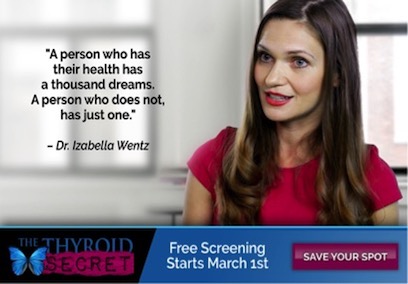
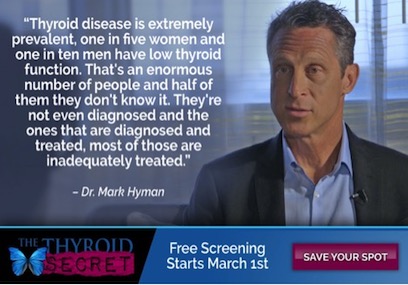
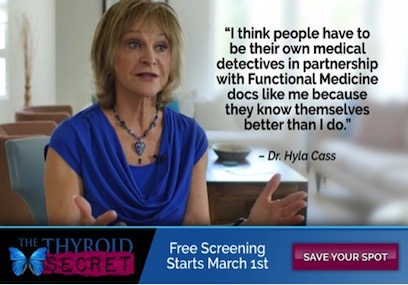
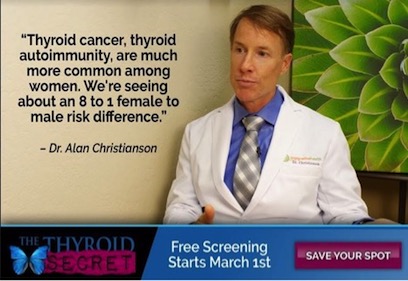
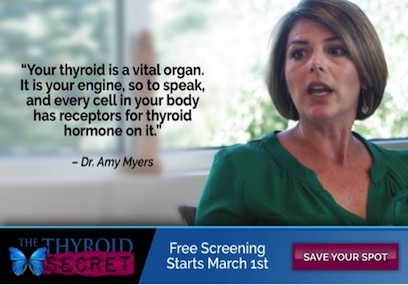
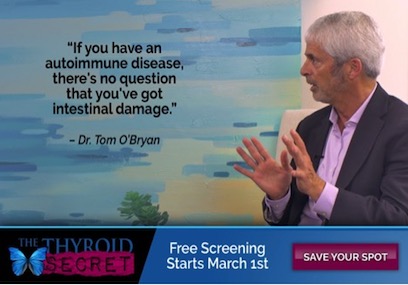
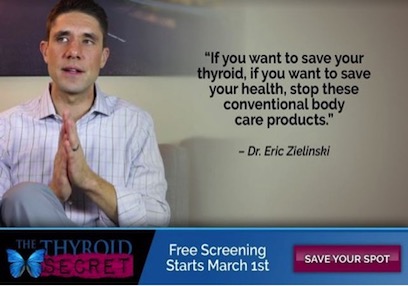
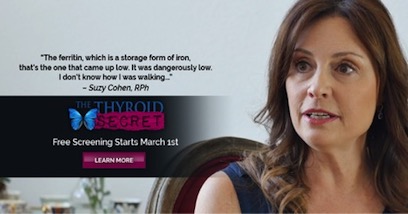
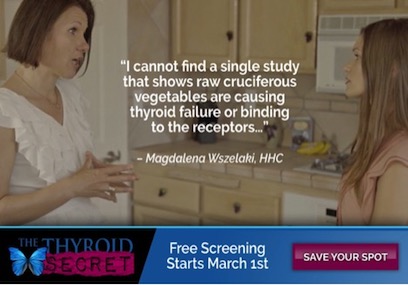
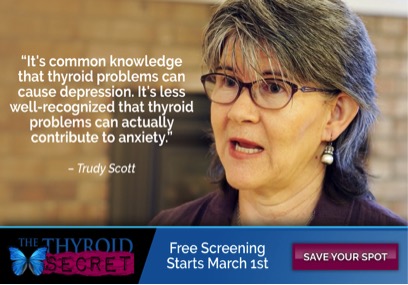
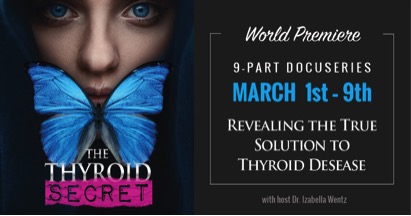
Hi Trudy,
I hope you are well I was wondering if you could provide some insight as to the cause of my thyroid patters. I have a low WBC (4.60 – not sure what the units are), low TSH (1.05), low T3 (68), low free T3 (2.20), and normal/low T4 (6.40). I have compound heterozygous MTHFR and pyroluria. I am on a host of supplements (zinc, B6, EPO, thyroid (dessicated glandular – Allergy Research), Apex thyroid homeopathic, a combination of various amino acids supporting neurotransmitters, piracetam, rhodiolia/ginseng complex, fermented cod liver oil, emu oil, support for progesterone (low levels of progesterone, very bad PMS), B complex, B 12,
I was wondering if you could provide some insight as to the cause of my thyroid patters. I have a low WBC (4.60 – not sure what the units are), low TSH (1.05), low T3 (68), low free T3 (2.20), and normal/low T4 (6.40). I have compound heterozygous MTHFR and pyroluria. I am on a host of supplements (zinc, B6, EPO, thyroid (dessicated glandular – Allergy Research), Apex thyroid homeopathic, a combination of various amino acids supporting neurotransmitters, piracetam, rhodiolia/ginseng complex, fermented cod liver oil, emu oil, support for progesterone (low levels of progesterone, very bad PMS), B complex, B 12,
iron support, Apex neuroflam, D 10,000 IU, liver support, HPA axis support (Apex Thyraxis), and probably some more…)
Like I said… a lot. I’ve done a lot in the last 3.5 months. I have completed a parasite protocol, a detox, I’ve gotten my adrenals tested (I produce enough cortisol, but my rhythms are a bit off – my cortisol dips by a lot and quickly from the morning to noon), and I have gotten tested for infections (clean as a whistle). Yet, when I got my thyroids tested 3.5 months after starting a copious amount of protocols, the numbers hadn’t budged at all. I don’t know what could possibly be triggering this response… Any thoughts??
Thank you so much.
Blessings,
Grace
Grace
I can’t offer specific advice via the blog but labs not shifting and adrenal issues and low iron /low B12 you have to find the underlying cause. I’d suspect some infection (hard to comment without knowing what stool testing was done – maybe even Lyme disease), toxic exposure, leaky gut, food sensitivity and consider low HCl and various nutritional deficiencies too. Find a practitioner to do a functional blood analysis too – it’s very useful.
And yes cognitive issues are very common with poor thyroid health. Low catecholamines are too and tyrosine helps both low catecholamines and is a great thyroid nutrient.
And I hope you’re tuned in to The Thyroid Secret – I’m sure you’ll get more insights from all the amazing speakers (register here http://thethyroidsecret.go2cloud.org/aff_c?offer_id=102&aff_id=1050)
Oh, I forgot to mention that my biggest complaint is cognitive impairment – brain fog, word recall, difficulty putting thoughts into words, difficulty pronouncing words, general difficulty speaking (is it common for thyroid conditions to impact speech?)
Thanks!
Hi Trudy,
Thanks so much for all the time you take to answer questions.
I have been prescribed almost every single SSRI there is over the years for OCD/Depression, without much success. I’m pretty well regulated at this point after years of therapy etc, am on no medications currently, but do have a prescription for Clonazapan. Originally I was prescribed it as needed for high anxiety times but I have come to find it beneficial in another way. Twice a week I will take 1mg before bed and the next day (and day after to a less degree) I will feel a lot more focused, calm, less anxious, and like my brain chemistry is more balanced. This is not how Clonazapan is traditionally used but I feel it’s an interesting clue into my brain chemistry.
I’d like to find an alternative to Clonazapan and was wondering if you had any specific suggestions? Knowing that Clonazapan works by acting on GABA receptors my initial thought was to take some type of GABA supplement. Would that make sense and if so what would you recommended. And would you recommend complimenting this with anything else?
Thanks so much.
Best,
DO
DO
I can’t offer you specifics via the blog but have my clients do the amino acid questionnaire and then do a trial to find out the ideal starting dose of the amino acid (some need GABA, some need tryptophan for anxiety) https://www.everywomanover29.com/blog/how-to-do-an-amino-acid-trial-for-anxiety/
Keep in mind that there can be many underlying causes of anxiety and low serotonin/low serotonin are just one. If the anxiety is thyroid related (like Hashimoto’s or Graves) then that would need to be addressed. Also I always look at diet, blood sugar control, caffeine, gluten, gut health etc.
The interesting thing is that some of these same root causes can trigger both anxiety and be a factor with thyroid issues so do tune in to The Thyroid Secret documentary – so much is being covered! It’s also all online. (register here http://thethyroidsecret.go2cloud.org/aff_c?offer_id=102&aff_id=1050)
Also the benzodiazepines have their own set of problems with tolerance and withdrawal (and also causing anxiety and insomnia) so do check out the many blogs on this topic on my site.
Thanks for your response.
When trying out different amino acids how long is a general guideline for a trial period? I began taking INOSITOL 7 days ago and am currently taking 8g a day. I have seen no signs of any improvement with OCD/mild depression. I’ve been using a powder form, mixing with water. If anything I have noticed that I am slightly nauseous/low mood , but I of course can’t be sure this is the direct cause.
I next would like to try 5-HPT but am conflicted. I know that in the studies done, the participants took 18g for weeks/months before the affects were concluded.
I know you cannot give specific advice to people but I am wondering if you have any general guidelines for people trying out different amino acids as to how long they should try one before concluding one way or another.
Best,
Darren
Darren
I start with tryptophan for OCD/mild depression (and typically adjust aminos each week) and then 5-HTP (if tryptophan trial didn’t work and then consider inositol. With both I see results right away if they are needed. Nausea can be caused by inositol in some people.
Dear Trudy,
I really enjoy reading your blogs, thank you so much for all the useful information regarding anxiety and natural remedies. I have a question regarding Hashimoto’s and GABA use for anxiety treatment.
Do you know if there is a correlation between TSH levels and GABA use, is it safe for use when you have Hashimoto’s? Thanks in advance for your reaction.
Warm regards,
Mila
Mila
I have many clients with Hashimoto’s do very well with GABA if they have low GABA levels